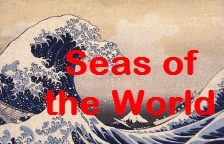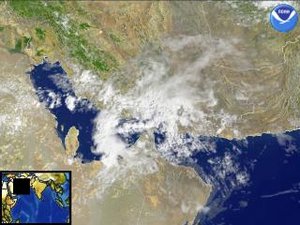Gulf (Persian Gulf)
Persian Gulf
Seas of the World  The Persian Gulf ( 26°54'17.00"N, 51°32'51.00"E), also known as the Arabian Gulf, is a 989 kilometer-long inland sea that separates Iran from the Arabian Peninsula.
The Persian Gulf ( 26°54'17.00"N, 51°32'51.00"E), also known as the Arabian Gulf, is a 989 kilometer-long inland sea that separates Iran from the Arabian Peninsula.
The name derives from the fact that the great Achaemenid Empire in the sixth century B.C.E. had its center of power in the province of Fars (Pars/ Persis) in the southwestern region of the Iranian plateau.
Its western end is marked by the major river delta of the Arvand/Shatt al-Arab River, which carries the waters of the Euphrates and the Tigris. At the eastern end, is the Strait of Hormuz. Located between Oman and Iran, the Persian Gulf is just 55 kilometers wide.
 Satellite image of the Persian Gulf (Source:NOAA Environmental Visualization Program)
Satellite image of the Persian Gulf (Source:NOAA Environmental Visualization Program) Countries with a coastline on the Persian Gulf, called the Persian Gulf States or the Gulf States, are (clockwise, from the north): Iran (Persia), United Arab Emirates, Saudi Arabia, Qatar on a peninsula off the Saudi coast, Bahrain on an island, and Kuwait and Iraq in the northwest. There have been, and continue to be, significant territorial disputes between Persian Gulf countries. Besides the Iraqi invasion of Kuwait in August 1990, and before that the Iran-Iraq War from 1980 to 1988, another important dispute is between the UAE and Iran over ownership of three islands -- Abu Musa, Greater Tunb Island, and Lesser Tunb Island, all strategically located in the Strait of Hormuz. The three islands were effectively occupied by Iranian troops in 1992. In 1995, the Iranian Foreign Ministry claimed that the islands were "an inseparable part of Iran." Iran rejected a 1996 proposal by the Gulf Cooperation Council (GCC) for the dispute to be resolved by the International Court of Justice, an option supported by the UAE. On December 31, 2001, the GCC issued a statement reiterating its support for the UAE's sovereignty over Abu Musa and the Tunbs, declared Iran's claims on the islands as "null and void," and backed "all measures...by the UAE to regain sovereignty on its three islands peacefully."
Today the Gulf is one of the most strategic waterways in the world due to its importance in world oil transportation. It contains 715 billion barrels of proven oil reserves, representing over half (57%) of the world's oil reserves, and 2,462 Tcf (trillion cubic feet) of natural gas reserves (45% of the world total). Persian Gulf countries maintain about one-third of the world’s productive oil capacity.
Oil flows out of the region through several of oil transit chokepoints. Chokepoints are critically important to world oil trade because so much oil passes through them, yet they are narrow and theoretically could be blocked -- at least temporarily. In addition, chokepoints are susceptible to pirate attacks and shipping accidents in their narrow channels. The vast majority (about 90%) of oil exported from the Persian Gulf transited by tanker through the Strait of Hormuz, located between Oman and Iran. The Strait consists of 2-mile wide channels for inbound and outbound tanker traffic, as well as a 2-mile wide buffer zone. Oil heading westwards by tanker from the Persian Gulf towards the Suez Canal or Sumed pipeline must pass through the Bab al-Mandab. Located between Djibouti and Eritrea in Africa, and Yemen on the Arabian Peninsula, the Bab al-Mandab connects the Red Sea with the Gulf of Aden and the Arabian Sea. After passing through the Bab al-Mandab, oil en route from the Persian Gulf to Europe must pass either through the Suez Canal or the Sumed Pipeline complex in Egypt. Both of these routes connect the Red Sea and Gulf of Suez with the Mediterranean Sea.
The Persian Gulf region was the center of two conflicts involving Iraq and U.S.-led coalitions in the late 20th and early 21st century. The First Persian Gulf War (Jan.– Feb., 1991) was an armed conflict between Iraq and a coalition of 32 nations including the United States, Britain, Egypt, France, and Saudi Arabia. It was a result of Iraq's invasion of Kuwait on Aug. 2, 1990; Iraq then annexed Kuwait, which it had long claimed. The Second Persian Gulf War, also known as the Iraq War (Mar.–Apr., 2003) was a largely U.S.-British invasion of Iraq.
Further reading
- Persian Gulf online
- Persian Gulf, The Encyclopaedia of the Orient